
Book a Consultation
Thank you!
Your form has been sent successfully.

An unknown primary cancer (CUP) is a rare disease in which malignant (cancer) cells are found anywhere in the body, but the source of the cancer is unknown. It is not always possible to find out from where the primary cancer has originated.
Unknown primary cancer is classified into four different forms. During a biopsy, a pathologist examines a tumor sample under a microscope, and identify the CUP type.
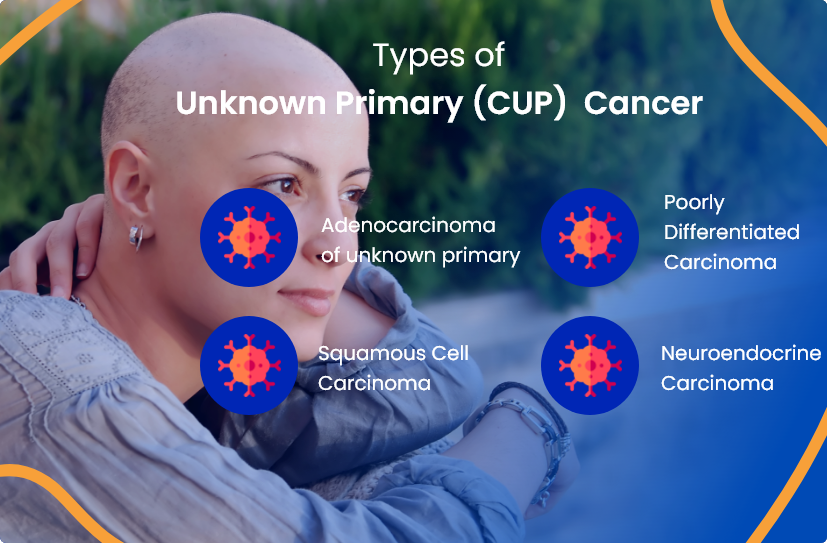
Over 70% of tumors classified as ‘unknown primary’ are adenocarcinomas. It can form in almost any organ in the body but primarily originates in the glands that line the insides of the organs and spread throughout the body. It is common for adenocarcinoma to occur in the lungs, pancreas, breasts, prostate, stomach, liver, and colon.
Poorly differentiated cancer cells occur in about 20 to 30 percent of all malignancies of unknown primary. Because epithelial cells appear so different from regular cells, doctors are unable to identify which type of epithelial cells caused cancer.
Squamous cell carcinoma consists of flat epithelial cells located on the skin's surface or in the lining of specific organs like the mouth and esophagus. Some lung cancers are squamous cell carcinomas.
This cell group contains or produces a wide variety of hormones. Because neuroendocrine carcinoma can appear anywhere in the body, identifying its primary site of origin can be difficult.
If symptoms occur, they may include:
 weight loss
weight loss
 a lump in any part of the body
a lump in any part of the body
 a persistent cough or hoarseness
a persistent cough or hoarseness
 changes in bowel or bladder habits
changes in bowel or bladder habits
 persistent fever or night sweats
persistent fever or night sweats
The unknown primary is a form of cancer that has spread from a primary location, the disease has already spread by the time it is detected. Even though there are no established treatments for malignancies of uncertain origin, chemotherapy is preferred.
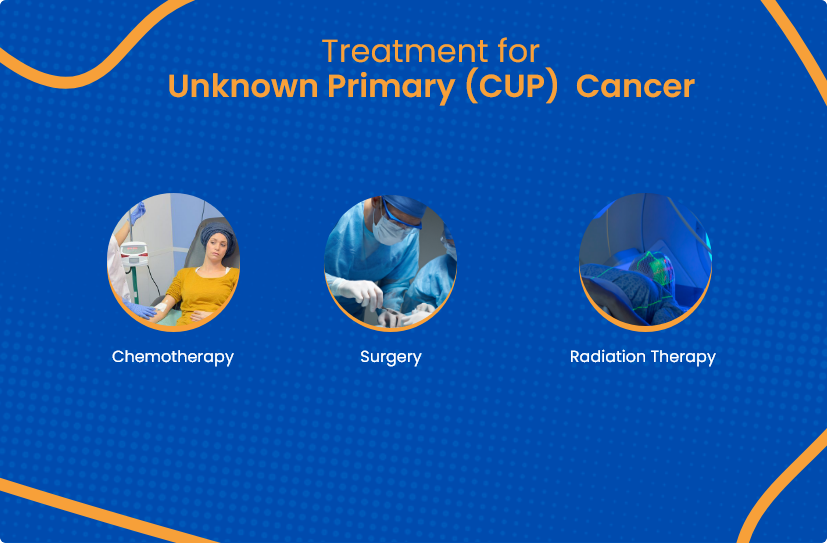
Chemotherapy is administered intravenously or orally, killing cancer cells all over the body. This may include regions where cancer is yet to be found. Chemotherapy is a treatment that shrinks tumors and relieves the symptoms. It can, in rare situations, completely eradicate malignancies, ensuring the patient requires no further therapy.
Surgery is prescribed for ‘unknown primary cancer’, if a tumor of unknown origin appears in only one organ or lymph node or if there are specific symptoms related to the location of the tumor.
Radiation therapy is only used to treat malignancies that cannot be removed surgically or when cancer of unknown origin spreads to the spine and affects neurologic function.
Doctors use the following tests for diagnosing cancer of unknown primary:

The healthcare practitioner will ask about signs and symptoms before performing a physical examination to look for lumps, enlarged lymph nodes, or anything odd. They might inquire about medical history, family medical history, and current health problems.

The color and composition of urine is examined.
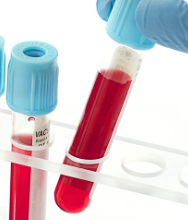
This blood test determines whether the body's organs and tissues are releasing substances into the blood at higher or lower than usual levels.
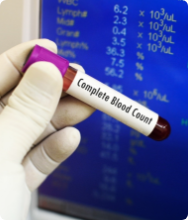
The number and proportion of red and white blood cells, platelets, and hemoglobin are all checked in this blood test.
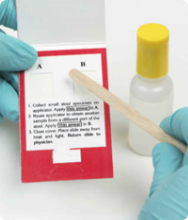
A test using a microscope to look for even the tiniest quantity of blood in feces (stool) is known as a Hemoccult test.
Our patients have access to a multispecialty team of professionals at ACTC, who work together in a highly collaborative and coordinated manner to provide all aspects of cancer care in one convenient location. Our doctors are supported by a clinical team with over two decades of experience and a reputation for providing tailored and supportive cancer care.
Talk to our experts at ACTC :

MD, Hematology & Oncology

MD, Ph.D., Hematology/ Medical Oncology

MD, Radiation Oncologist

Once diagnosed with cancer, you face a series of hard choices. Our experts at ACTC will guide you and your family through every step of cancer treatment. With state-of-the-art technology and experienced cancer specialists, ACTC promises its patients world class healthcare.
Schedule a consultation by calling
 352-345-4565
352-345-4565
Unknown cancer or cancer of unknown primary (CUP) refers to a wide range of cancers. It affects roughly 3-5 percent of cancer patients. CUP patients are frequently diagnosed with many types of secondary cancers.
Unknown primary cancer occurs due to acquired or sporadic mutations. Exposure to cigarette smoking, UV light, radiation, or some cancer-causing substances are causes of this mutation. But they can also happen without any apparent cause.
Cells from this original location may break off and travel through the circulation or lymphatic system to other parts of the body. As the escaping cells grow and form new tumors, secondary cancers or metastases occur.
Schedule a consultation by calling
 352-345-4565
352-345-4565